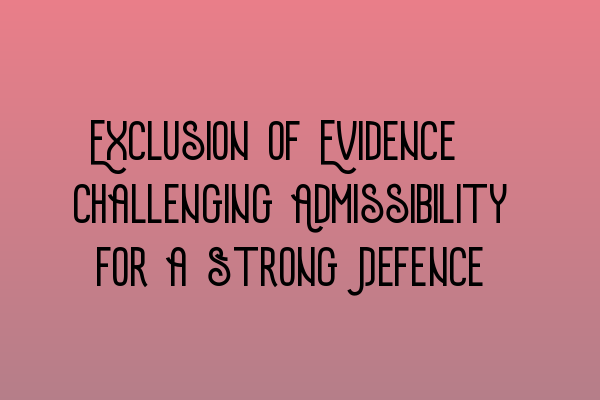Exclusion of Evidence: Challenging Admissibility for a Strong Defence
Welcome to SQE Criminal Law & Practice Law UK! In this blog post, we will delve into the intricacies of excluding evidence and how it can contribute to building a strong defence. As criminal law solicitors, it is crucial to be knowledgeable about the admissibility of evidence and the tools available to challenge its inclusion in a case.
Before we proceed, if you’re interested in demystifying the Solicitors Qualifying Examination format or learning about LLC formation in the UK, check out our related articles: Demystifying the Solicitors Qualifying Examination Format, LLC Formation Made Simple: Step-by-Step Guide for UK Entrepreneurs, and LLC Formation: A Step-by-Step Guide for UK Entrepreneurs.
The Importance of Excluding Evidence
In any criminal trial, the admissibility of evidence plays a critical role in determining the outcome. As a defence solicitor, your goal is to present the strongest possible defence for your client. This often involves challenging the admissibility of evidence, particularly if it was obtained illegally or if its inclusion would create an unfair prejudice against your client.
Excluding evidence that is inadmissible can significantly weaken the prosecution’s case and increase the chances of a favourable outcome for your client. It is therefore essential to understand the grounds on which evidence can be challenged and excluded.
Grounds for Challenging Admissibility
There are several grounds on which the admissibility of evidence can be challenged:
1. Hearsay
Hearsay evidence is often considered unreliable as it is based on statements made by someone who is not testifying in court. Challenging the admissibility of hearsay evidence involves demonstrating that it falls under one of the established exceptions or that its inclusion would violate the defendant’s right to a fair trial.
2. Illegally Obtained Evidence
If evidence was obtained through illegal means, such as an unlawful search or a breach of privacy rights, it may be excluded on the grounds that it was obtained in violation of the defendant’s rights. This requires proving that the evidence was obtained unlawfully and that its inclusion would infringe upon the defendant’s right to a fair trial.
3. Unreliable or Prejudicial Evidence
Evidence that is unreliable or highly prejudicial can also be challenged for exclusion. This includes evidence that is based on speculation, lacks credibility, or is likely to create undue bias against the defendant. Challenging the admissibility of such evidence requires presenting arguments and supporting evidence to establish its unreliability or potential for prejudice.
If you want to learn more about business regulations in the UK or gain a comprehensive legal insight into corporate structures, check out our related articles: Business Regulations in the UK: A Comprehensive Overview and Decoding Corporate Structures: A Comprehensive Legal Insight.
The Process of Challenging Evidence
Challenging the admissibility of evidence involves a strategic and methodical approach. As a defence solicitor, you need to carefully analyze the evidence, identify potential grounds for exclusion, and build strong arguments to support your challenges.
1. Research and Analysis: Conduct a detailed analysis of the evidence, including its source, how it was obtained, and its relevance to the case. Research precedents and legal principles that support your grounds for exclusion.
2. Drafting Legal Submissions: Prepare well-structured and persuasive legal submissions outlining the grounds for challenging the admissibility of the evidence. Integrate relevant case law and legal principles to support your arguments.
3. Court Presentation: Present your legal submissions in court, emphasizing the reasons why the evidence should be excluded. Engage with the judge, opposing counsel, and any witnesses involved in the case to strengthen your arguments.
4. Expert Testimony: In some cases, it may be necessary to call expert witnesses to testify on matters related to the admissibility and reliability of the evidence. This can further enhance your challenge and bolster the credibility of your defence.
Conclusion
Excluding evidence is a powerful tool in building a strong defence for your clients. By challenging the admissibility of evidence on grounds such as hearsay, illegally obtained evidence, or unreliable and prejudicial evidence, you can significantly weaken the prosecution’s case and improve the chances of a favourable outcome.
At SQE Criminal Law & Practice Law UK, we are committed to providing the best legal services and resources to defence solicitors. If you found this blog post helpful, please explore our website for more valuable information and insights.
Remember, if you’re interested in demystifying the Solicitors Qualifying Examination format or learning about LLC formation in the UK, check out our related articles: Demystifying the Solicitors Qualifying Examination Format, LLC Formation Made Simple: Step-by-Step Guide for UK Entrepreneurs, and LLC Formation: A Step-by-Step Guide for UK Entrepreneurs.
